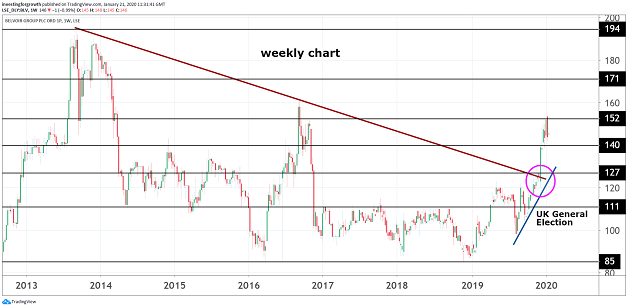Stockwatch: A share for capital growth and income
The election result has released pent-up demand, and an uptick in the housing market bodes well.
21st January 2020 11:43
by Edmond Jackson from interactive investor
Share on
The election result has released pent-up demand, and an uptick in the housing market bodes well.

Post the general election, AIM-listed shares in Belvoir Group (LSE:BLV) re-rated from about 125p to over 152p a week or so ago. They’re currently around 145p, which capitalises the business at just over £50 million. The rise looks logical, especially now house prices are revealed to be rising at the fastest monthly rate of 2.3% since Rightmove devised this monthly index two decades ago.
It is possible that the realities of Brexit result in net harm rather than benefit for the economy, and/or other adverse factors intrude to dampen the housing market again. But, for now, there’s a release of pent-up demand. The approach of the spring home-buying season could sustain this further and generate a self-fulfilling effect for at least the rest of this year.
Attractive investment and operating financial ratios
For a small cap with declared intent to double its market value, a 12-month forward price/earnings (PE) ratio of 10x and strong profile in free cashflow (see table), which supports a prospective dividend yield of 5.3%, even after the recent share price rise, the context is interesting.

Source: TradingView Past performance is not a guide to future performance
I do have concerns that this is yet another acquisitive stock market operation that’s run up a fair amount of debt and other liabilities, as if the dividend payout is partly to impress. And, not surprisingly, there’s a lump of intangibles on the balance sheet due to buying agency type businesses.
A sceptic might also say that a ban on tenant fees came into effect from last June, hence some substitution effect is currently required, although (to the extent you can trust trading updates) management said five weeks ago that trading in the second half-year “continues to be strong” putting the group “comfortably” in line to meet market expectations. Consensus suggests £4.6 million of net profit, for a 20% rise in normalised earnings per share (EPS) to 12.5p.
Excellent operating margins – over 30% in 2017 and 2018 – make for attractive return on capital ratios – around 19% on equity and 15% on total capital. So, I have a fear of missing out, given the renewed share price rise looks logical, a market-friendly general election outcome, plus early signs of housing market vigour. These are all factors that could conflate very usefully with Belvoir’s attractive operating ratios.
Market expectations for 2020 are for £5.3 million net profit and a 15% advance in EPS to 14.3p, which, albeit a snapshot in time, compares favourably with a 12-month prospective PE of around 10x, implying value according to a key growth stock measure. Risks to this scenario are also mitigated somewhat by stronger figures for free cashflow in recent years (see table).
A better-balanced services model emerging
Founded in 1995 and listed on AIM in 2012, Belvoir is the UK’s largest property franchise operation, with 372 offices across residential lettings and sales, property management and financial services. It had been called Belvoir Lettings until last July but has spread its reach, hence it has a better grip on the current rise in residential sales and implied financing due.
Interim 2019 gross profit weighed 66% to lettings, 15% from sales and 19% from financial services. However, it should balance out further. Last month, for example, Belvoir paid £2 million for Lovelles estate agency, dating back to 1932 as a family business and now the largest agency in the Lincolnshire and Humber region with a franchised network of 19 branches.
Bought with cash reserves, it was said to be “earnings accretive in 2020”. It’s also seen as an appropriate fit with the East Midlands’ Newton Fallowell group, acquired in 2015.
Also, and despite challenging market conditions, last September’s interims showed a 23% rise in Belvoir’s adjusted pre-tax profit to £3 million on revenue up 48% to £9.1 million, helped by the November 2018 acquisition of MAB Gloucester which boosted financial services revenue from £1.3 million close to £4 million, approaching half of group revenue.
Financial services are promoted as “a real differentiator” following the 2017 acquisition of Brook Financial Services, which continued its strong path in the first half of 2019 with revenue by 21% higher after achieving 20% for 2018 as a whole.
The strategy is to grow the number of advisers and pair them with franchise offices. Belvoir says, “we now have 66 group offices introducing leads to our financial services adviser network and are working to achieve further penetration.”
While the UK industry context has seen office closures, both among smaller independent and larger networks, Belvoir has sustained some 300 franchised offices nationwide, albeit in four new locations, reflecting some churn. Interim average revenue per office rose 6% to £133,000, which one could regard as the underlying growth rate.
Within this, recurring revenue from lettings rose 4% and property sales by 7% despite property transactions easing 2.2%. Average revenues ought now to improve with the market, and greater emphasis on estate agency within lettings-oriented offices. “We continue to see sales as a real growth opportunity for our network,” says Belvoir.
This should be helped also by a new software platform for estate agency franchisees, enabling them to benefit from productivity tools: Belvoir is 10 months into a two-year rollout, having appointed a head of digital last April.
Founder/former chairman has sold half his holding
Following September’s interim results, demand for a share placing was such that the founder and former chairman was able to offload 6.3% of the issued equity at 105p (exactly half his holding), more than the 5.7% he’d intended to sell at the start of the book-build.
This seems fair enough as a founder-retiree. The only other insider dealing has been the CEO just lately exercising 163,399 options at 75p and selling 143,399 shares to help with tax arising and cost of the exercise. He continues to hold 483,595 shares, or 1.4% of those issued.
So, while there’s been an element of cashing in, it doesn’t appear to reflect a need to do so “while the going is good”. I’d put more emphasis on the positive December update and now bullish news on the housing market.
| Belvoir Group - financial summary | ||||||
|---|---|---|---|---|---|---|
| year ended 31 Dec | 2013 | 2014 | 2015 | 2016 | 2017 | 2018 |
| Turnover (£ million) | 5.8 | 5.9 | 7.0 | 9.9 | 11.3 | 13.7 |
| Operating margin (%) | 26.5 | 27.7 | 28.0 | 22.7 | 33.5 | 39.1 |
| Operating profit (£m) | 1.6 | 1.6 | 2.0 | 2.3 | 3.8 | 5.4 |
| Net profit (£m) | 1.2 | 1.3 | 1.7 | 1.8 | 3.0 | 4.4 |
| Reported earnings/share (p) | 5.9 | 5.6 | 6.4 | 5.5 | 8.1 | 11.8 |
| Normalised earnings/share (p) | 5.9 | 3.8 | 7.3 | 7.2 | 9.1 | 10.4 |
| Price/earnings multiple (x) | 13.8 | |||||
| Operating cashflow/share (p) | 4.1 | 1.0 | 6.7 | 7.1 | 10.1 | 12.4 |
| Capital expenditure/share (p) | 0.6 | 0.4 | 0.4 | 0.2 | 0.3 | 0.4 |
| Free cashflow/share (p) | 3.5 | 0.6 | 6.3 | 6.9 | 9.8 | 12.0 |
| Dividend per share (p) | 6.8 | 6.8 | 6.8 | 6.8 | 6.9 | 7.2 |
| Yield (%) | 5.0 | |||||
| Cash (£m) | 5.1 | 1.5 | 2.7 | 1.6 | 1.4 | 1.8 |
| Net debt (£m) | -2.8 | 0.0 | -1.7 | 5.4 | 5.1 | 9.6 |
| Net assets/share (p) | 30.2 | 29.1 | 47.2 | 51.5 | 55.6 | 61.8 |
| Source: historic Company REFS and company accounts |
Debt and liabilities on the balance sheet
Mind how £29.2 million intangibles constitute 130% of net assets, although this is to be expected from acquiring agency businesses. The end-June debt profile was £0.9 million near-term debt and £10 million longer-term debt, versus £1.4 million cash, for net gearing of 42%.
This could be seen as “optimal gearing” for an acquirer, and the interim income statement showed that modest £179,000 finance costs were substantially offset by £113,000 finance income.
A conservative view of “debt” might also include £0.7 million lease liabilities, £2 million deferred tax and £0.9 million contingent consideration, which bumps the net figure realistically to over 58%. The balance sheet is plenty strong, however, in terms of liquidity ratios – current assets at 1.6x current liabilities and trade receivables 2.4x trade payables.
So, if Brexit realities turn adverse for the housing market going into 2021, balance sheet risks still seem low. The chief potential hit would be a hike in interest rates also affecting mortgages, which seems an outlier.
Looking to the cash flow statement, dividends absorbed £1.3 million in the first half, or 56% of cash generated from operations, which could be seen as rather tight versus investing activities and loan/lease repayments.
But, if revenues grow stronger this year, Belvoir’s attractive financial ratios should boost cashflow, and last June the group was said to be comfortably inside its bank covenants. For capital growth and income: Buy.
Edmond Jackson is a freelance contributor and not a direct employee of interactive investor.
These articles are provided for information purposes only. Occasionally, an opinion about whether to buy or sell a specific investment may be provided by third parties. The content is not intended to be a personal recommendation to buy or sell any financial instrument or product, or to adopt any investment strategy as it is not provided based on an assessment of your investing knowledge and experience, your financial situation or your investment objectives. The value of your investments, and the income derived from them, may go down as well as up. You may not get back all the money that you invest. The investments referred to in this article may not be suitable for all investors, and if in doubt, an investor should seek advice from a qualified investment adviser.
Full performance can be found on the company or index summary page on the interactive investor website. Simply click on the company's or index name highlighted in the article.
Disclosure
We use a combination of fundamental and technical analysis in forming our view as to the valuation and prospects of an investment. Where relevant we have set out those particular matters we think are important in the above article, but further detail can be found here.
Please note that our article on this investment should not be considered to be a regular publication.
Details of all recommendations issued by ii during the previous 12-month period can be found here.
ii adheres to a strict code of conduct. Contributors may hold shares or have other interests in companies included in these portfolios, which could create a conflict of interests. Contributors intending to write about any financial instruments in which they have an interest are required to disclose such interest to ii and in the article itself. ii will at all times consider whether such interest impairs the objectivity of the recommendation.
In addition, individuals involved in the production of investment articles are subject to a personal account dealing restriction, which prevents them from placing a transaction in the specified instrument(s) for a period before and for five working days after such publication. This is to avoid personal interests conflicting with the interests of the recipients of those investment articles.